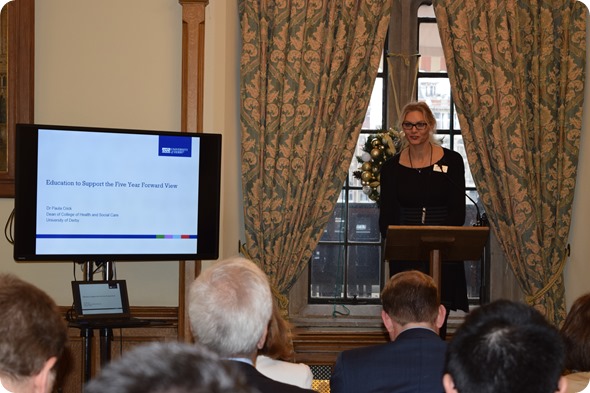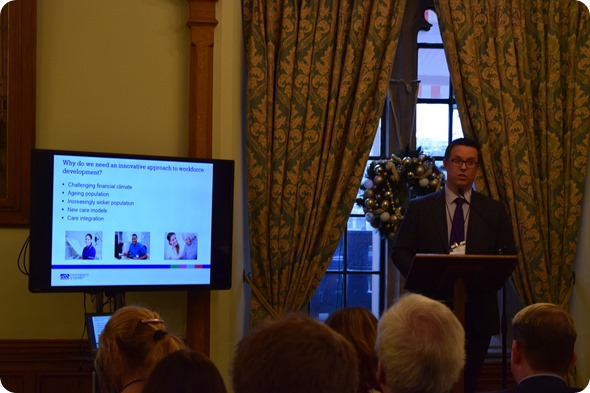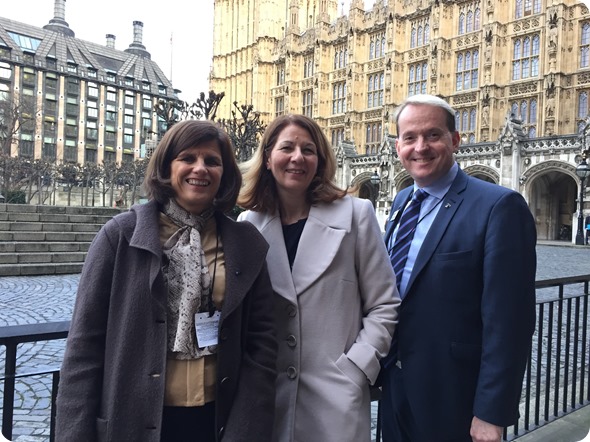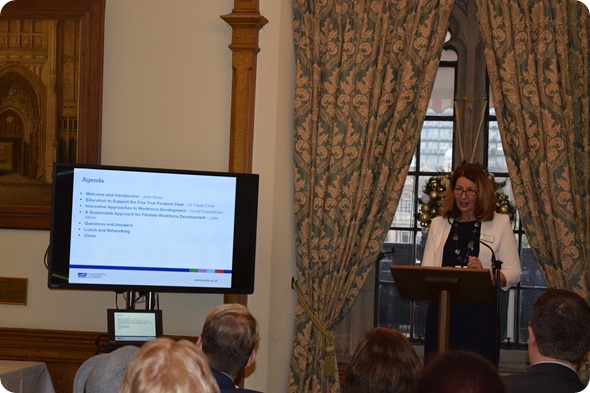Many of our lives have been touched by dementia and with an ageing population the challenge of finding a sustainable solution can seem insurmountable. The recent House of Commons Reception hosted by the University of Derby, however, highlighted some innovative approaches to health and social care development that may enable our workforces to cope with the hurdles that lie ahead.

Dean of College of Health and Social Care, Dr Paula Crick, envisioned a future where our health service is not just an illness service and where people with dementia are supported in their own home. She stressed that this would require a change in current workforces.
The University of Derby are keen to play an important role in transforming healthcare workforces by ensuring their students graduate fit for purpose and with a wealth of experience from their placements. They want to provide a successful career trajectory for healthcare workers.

Dr Paula Crick
MOOCs, or Massive Open Online Courses, are one way to enable this change according to Dr Crick. The University of Derby developed a dementia MOOC together with the help of various stakeholders, service users and carers. They have been wide reaching in their appeal, accessed by professionals, volunteers, carers and the families of those affected by dementia.
David Robertshaw seconded the benefits of MOOCs providing more affordable learning models whilst retaining quality. MOOCs are also more than just simple courses, they are learning communities providing a forum to enhance dialogue globally.
With around 44 million people worldwide living with dementia and the global figure predicted to triple by 2050 at an estimated cost of $600 billion, this unique space to transform care comes at a crucial time.

David Robertshaw
The first 6 week course, Bridging the Dementia Divide, featured content suitable for both Tier 1, Tier 2 and even some for specialists in Tier 3 according to David. He also described some of the content produced by the students including a heartfelt poem from a student caring for his mother. The hope is students will share their knowledge with friends, family and in the workplace.
Retention can be a significant problem for MOOCs. David described how the University of Derby undergo a Quality Assurance process to make sure content is compelling and keeps students engaged.
Overall MOOCs are hoped to make studying accessible to all, allowing those who have knowledge to share it with others at a significantly reduced cost thereby allowing us to collaboratively tackle major healthcare issues such as dementia.

Kathryn Mitchell, Julie Stone and Rod Dubrow-Marshall
Julie Stone, Director of University of Derby Online Learning, reinforced the challenges of addressing dementia, outlining Prime Minister David Cameron's wish for England to be the best country in the world for dementia care by 2020. Julie described how the NHS, one of the largest workforces in the world, will all require training on dementia, related to their role, in order to meet the Dementia Challenge. There is also a need for greater public awareness and for businesses to become dementia friendly.
With approximately 26,000 care homes across 79 regions in the UK, achieving a consistent approach can be challenging. Julie called upon technology to transform the health sector in the way it has with many other aspects of our lives.

Julie Stone
Giving the University of Derby as an example, Julie described how location had previously been a limiting factor to their reach, with students travelling in from a maximum radius of 40 miles. MOOCs have provided the ability to export higher education with 40% of students, 400 of whom are nurses, now from overseas.
The take home message: online courses provide a scalable solution for training individuals; an arena for professional debate and a vehicle for raising awareness. Training cannot continue the way it has always been done, a paradigm shift is required.
For more information: http://www.derby.ac.uk/online/free-courses